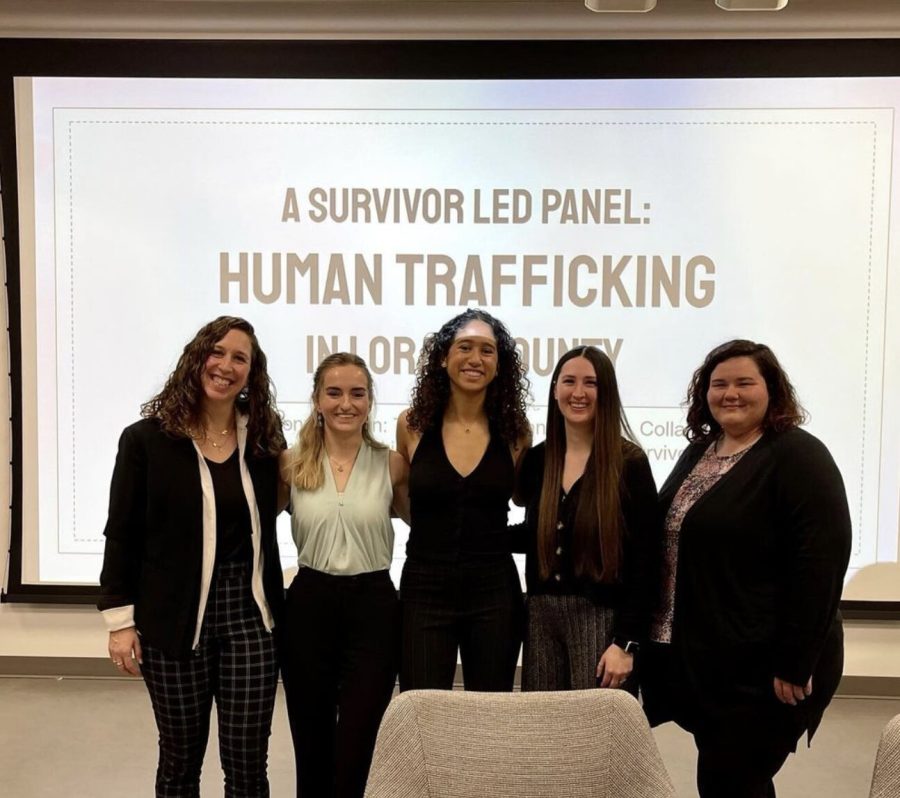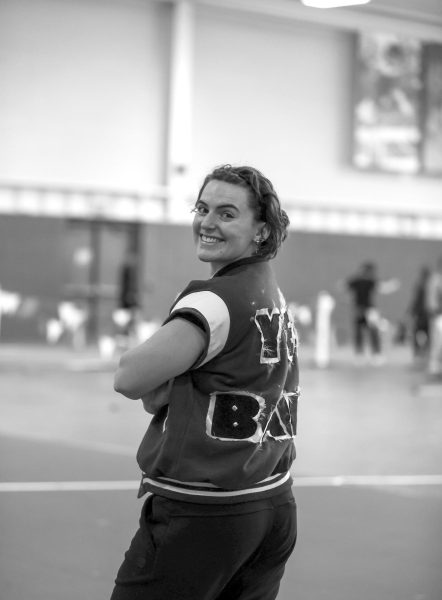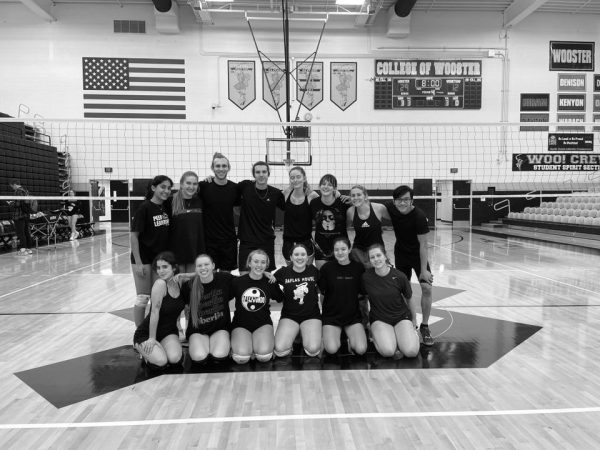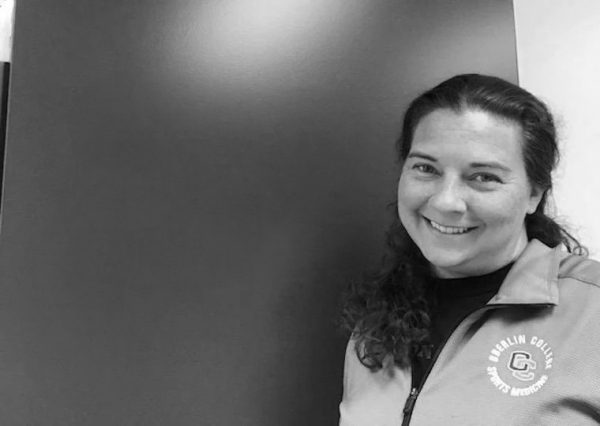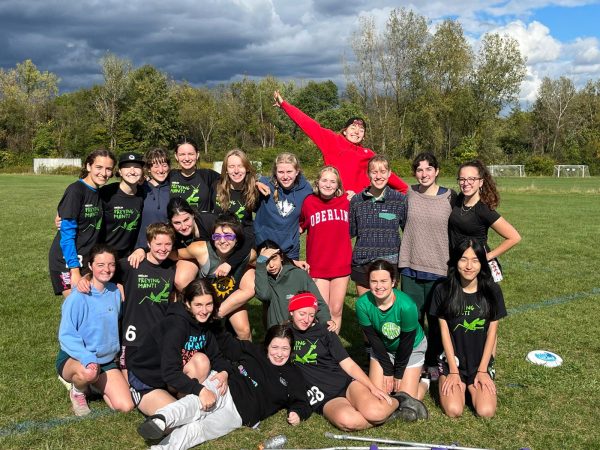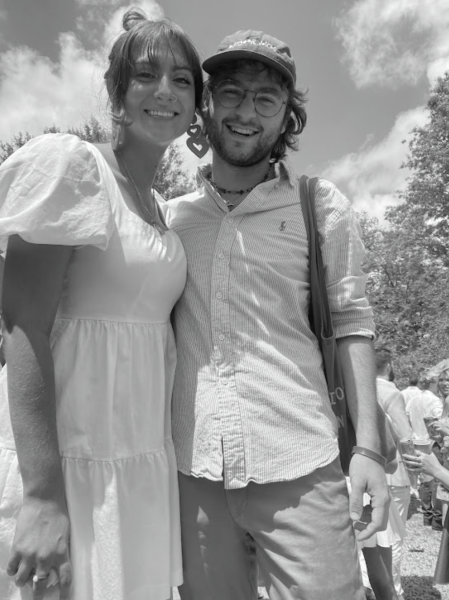In the Locker Room with Emma Hart, SOSHA Founder
Photo Courtesy of @oberlin_sosha
Emma Hart (second to left) co-facilitated a panel on human trafficking.
Editors’ note: This article mentions sexual harm.
Emma Hart is a fourth-year pole vaulter on the track and field team. In 2020, she co-founded the Survivors of Sexual Harm & Allies, a survivor-led organization dedicated to discussing sexual harm and rape culture at Oberlin. Throughout her time with the group, she has helped to plan and facilitate various events such as Take Back the Night and a recent panel on human trafficking in Lorain County. Hart reflected on the work that she has done with SOSHA and the legacy she hopes to leave with it after graduating this spring with degrees in Psychology and Dance.
This interview has been edited for length and clarity.
Why did you create SOSHA?
I founded SOSHA during my first year after seeing a lack of conversation around gender-based violence on campus. I found myself frustrated that there seemed to be a lack of spaces for people to talk authentically about their experiences and about what they received. I think I had expectations that there would’ve been more conversation, especially at a place known for social justice.
What is your current role within the organization?
I am currently the organizational advisor, which basically means working with our coordinators to support them in the roles that they have and trying to shape SOSHA in a way that it can continue without me after I graduate this spring.
What are some of the events planned with SOSHA that you’re proud of?
We do listening sessions pretty regularly. That’s been something really fulfilling to see. People come and feel comfortable and safe enough talking about their experiences or thoughts and having a place to do that. I am really proud of the open forums that we’ve done and Take Back the Night. And the energy of our organizer meetings is something that I felt really proud of this year — there’s a lot of passion that everyone has. At our last meeting I asked, “Is anyone graduating this spring?” In a room of 12 people, no one’s hands went up. I was really excited by that.
How has the track and field team supported SOSHA?
I would say that it’s been a really supportive space with both my teammates and coaches. There have been track teammates who have been involved in helping with our events and becoming organizers. I have some really wonderful teammates who have really let me lean on them. The team itself has been pretty active in helping the organization begin and coming to our events in support. I pole vault, so my specific event coach has been the one who I talked to a lot about SOSHA. He’s been a really good support person in making sure that I’m being grounded at practice — not stuck in work mode — and just being present.
What are some of the challenges you’ve faced?
On a personal level, I think that there have been moments that I’ve struggled with work life balance and always being in this mode of problem solving. As a leader, I’ve grown into being more aware of my own experience with trauma in different ways. I’m always learning how to interact more locally. There’s definitely been challenges to talking openly about sexual violence. SOSHA is really dedicated to doing that in a way that’s trauma-informed and supportive of survivors. People aren’t used to talking about these things because they’re so stigmatized and silenced. I think a host of things have arisen that, for the most part, are valid concerns that people have.
How have you initiated conversations about sexual harm within Oberlin athletics?
First I just try to have conversations in daily life with teammates and other athletes. We also work with different teams that have reached out for support and try to create education there for teams and athletics. It’s something that SOSHA has really tried to promote — we don’t necessarily have any type of formal survivor support 101.
We have worked with leaders from the baseball team who reached out to us in seeking a re- source on how they can be allies and how to address biases or belief systems that sometimes exist in athletic culture. That has been overall a pretty positive experience and has been like coalition building. Me and one other leader, Lauren Fitts, OC ’22, have continued to be involved in that project.
How do you hope to continue your advocacy after graduation? What do you hope SOSHA’s legacy is on campus after you leave?
I would hope to continue in some way being involved in anti-violence prevention work, specifically with boys and men. There’s some really interesting organizations that do that, and they teach skills like vulnerability and empathy. Culturally, young boys aren’t always given the space to demonstrate those things. I want to stay connected with SOSHA and be a resource for them so no one has to reinvent that wheel ever. I’m also interested in law school eventually.
As far as SOSHA’s legacy, I hope that it continues. I’m really hopeful that it will, especially with our amount of young leaders who are really energized, smart, and already really good at what they do. So I hope that there’s a lasting legacy of authentic conversation about sexual violence on campus, so no survivor ever feels alone in going through their healing process.


